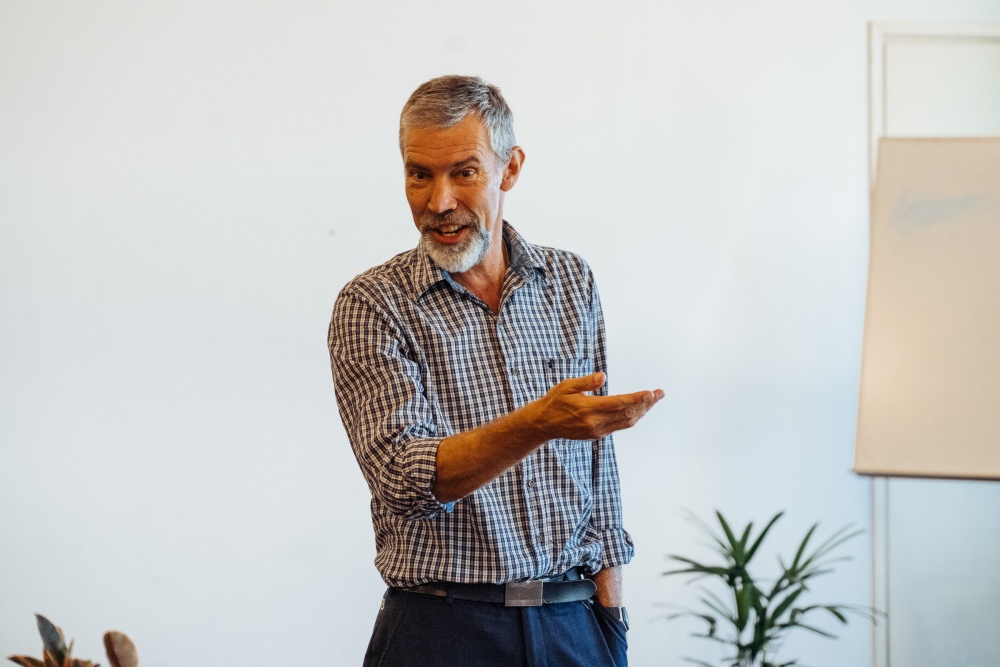
MARK DELANEY, coordinator for ‘Living the Change’ in the Australian Religious Response to Climate Change, writes about why he’s involved with the movement…
“We used to be able to plant our crops on the same day every year, knowing the rains would arrive soon to water them. Now, sometimes the monsoon comes early, sometimes late, sometimes not at all.”
The farmer I was talking to in India had never heard of climate change. All he knew was that farming practices, stable for generations, were changing.

Mark Delaney, speaking at an event in Brisbane in September. PICTURE: Mick Porter.
I’ve worked as a Christian development worker in India for 18 years. For the last five I’ve shifted my focus to the climate emergency, as I’ve become convinced that it is the biggest single issue facing our generation. If we don’t act decisively soon to reduce our carbon emissions, temperature rises of two to five degrees Celsius will be ‘locked in’ with the result that many of the painstakingly achieved development gains in India and elsewhere will be wiped out.
No only that, our children will inherit a much harsher world than we have enjoyed. They will have to deal with more frequent and severe heatwaves, cyclones, droughts and floods; and they will need to come to terms with tens of millions of refugees knocking at our door as people lose their homes in the Pacific and Asia to rising sea levels.
“My faith as a Christian is central to my involvement. Jesus instructs us to care for the ‘least’. Clearly, those most adversely affected by the climate emergency are the ‘least’ – our Pacific neighbours losing their homes, and the poor in Asia struggling to grow enough food.”
For us to solve this, the biggest crisis humanity has ever faced, we will need to work at many levels; convincing politicians to aim for more ambitious emissions reductions, encouraging companies to move away from fossil fuel-based production, and imploring the media to help us, as its readers and viewers to come to terms with the gravity of the situation, rather than allowing us to suppress our angst under the latest sports result.
As important as those changes in politics, commerce and the media are, the difficulty is that they all require other people to change. But the only person we can directly change is ourselves. That truth is both terrifying and empowering. It’s terrifying because it causes us to realise that the thing driving the climate emergency is us. When we take that overseas holiday, it requires carbon emissions, and when we turn up the air-conditioner during summer, it requires more emissions. However, the fact that the only person we can change is ourselves is also empowering, as it means we can take responsibility for helping to solve this crisis by leading lower-carbon lives.
That’s why I work with the Australian Religious Response to Climate Change. In recent months, together with other colleagues in ARRCC, we have run ‘Living the Change’ seminars for people of faith in how to live out the change we want to see in the world by leading more environmentally responsible lives.
We’ve found many people making very significant, counter-cultural decisions for the sake of the environment: Miriam hasn’t flown in 10 years; Ken and Harriet have built a house entirely from recyclable materials; and Rob has purchased an electric car, generating all the power it needs from solar panels on his roof.
My faith as a Christian is central to my involvement. Jesus instructs us to care for the ‘least’. Clearly, those most adversely affected by the climate emergency are the ‘least’ – our Pacific neighbours losing their homes, and the poor in Asia struggling to grow enough food.
We are also exhorted by our faith to seek justice. The climate emergency has primarily been driven by over-consumption in the West, yet those in the developing world, including my friends in Indian slums, are most affected. That is patently unjust, and God can’t be happy with it. We might even say that we are called to take the carbon ‘log’ out of our own ‘eye’ before, or at least at the same time, asking others to change.
Mark Delaney is coordinator for ‘Living the Change’ in the Australian Religious Response to Climate Change and co-author of ‘Low Carbon and Loving It’, published in 2018.





